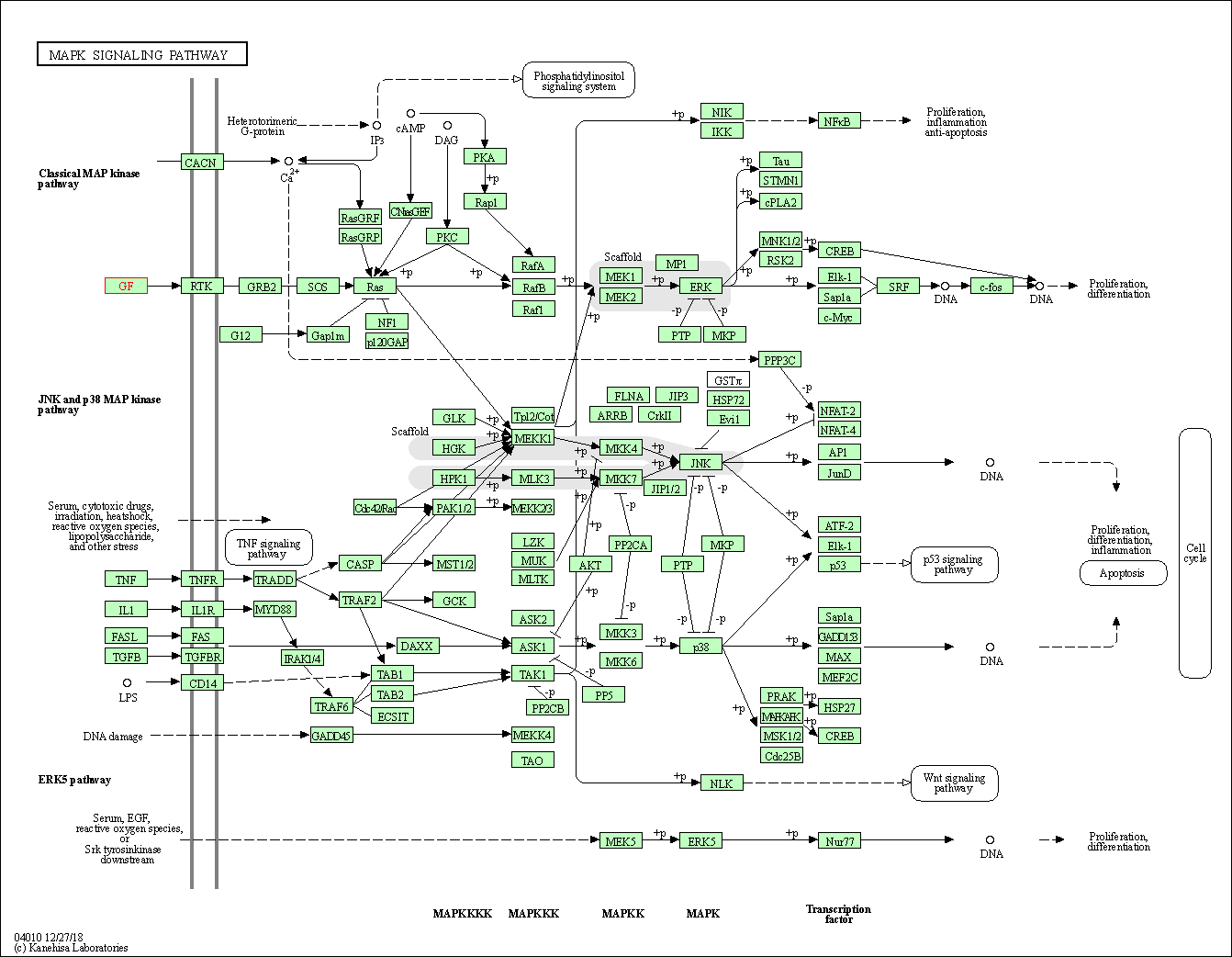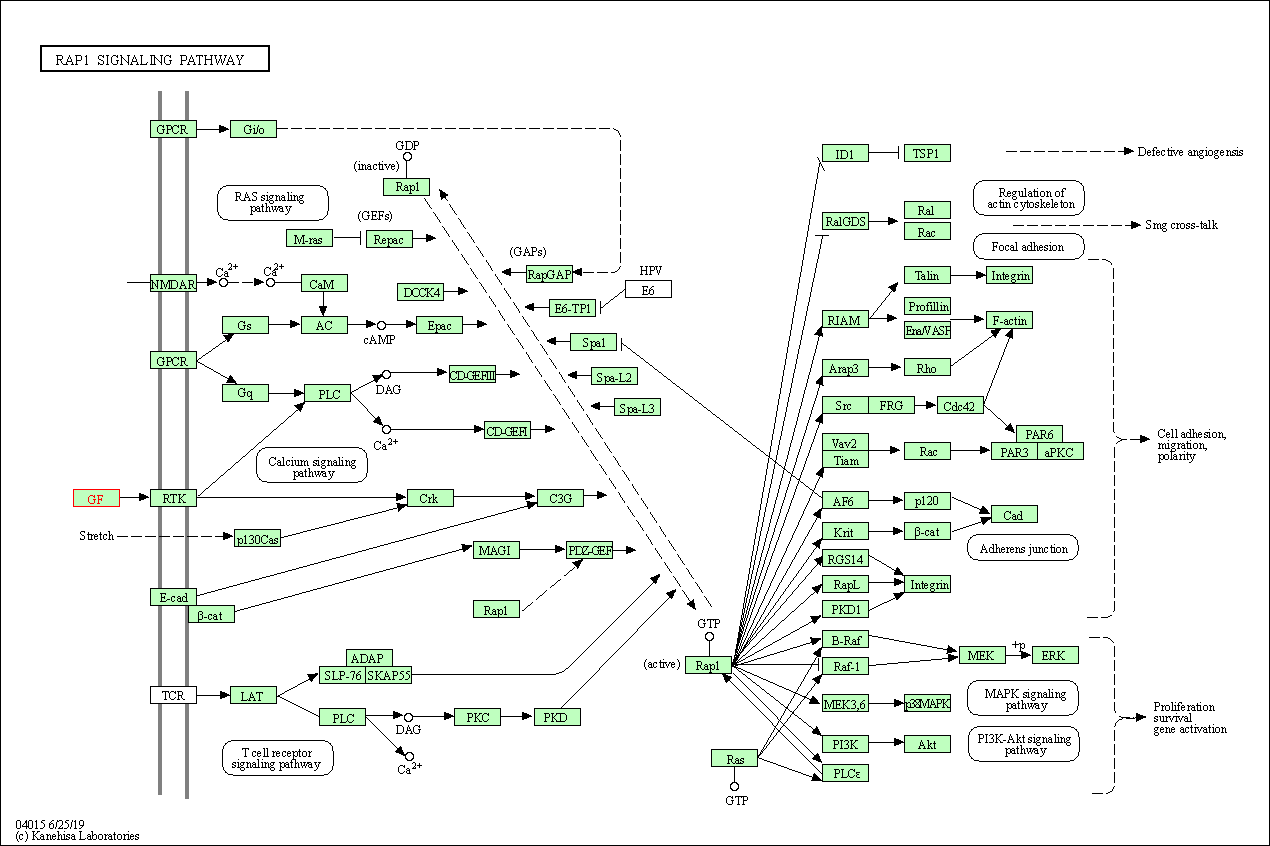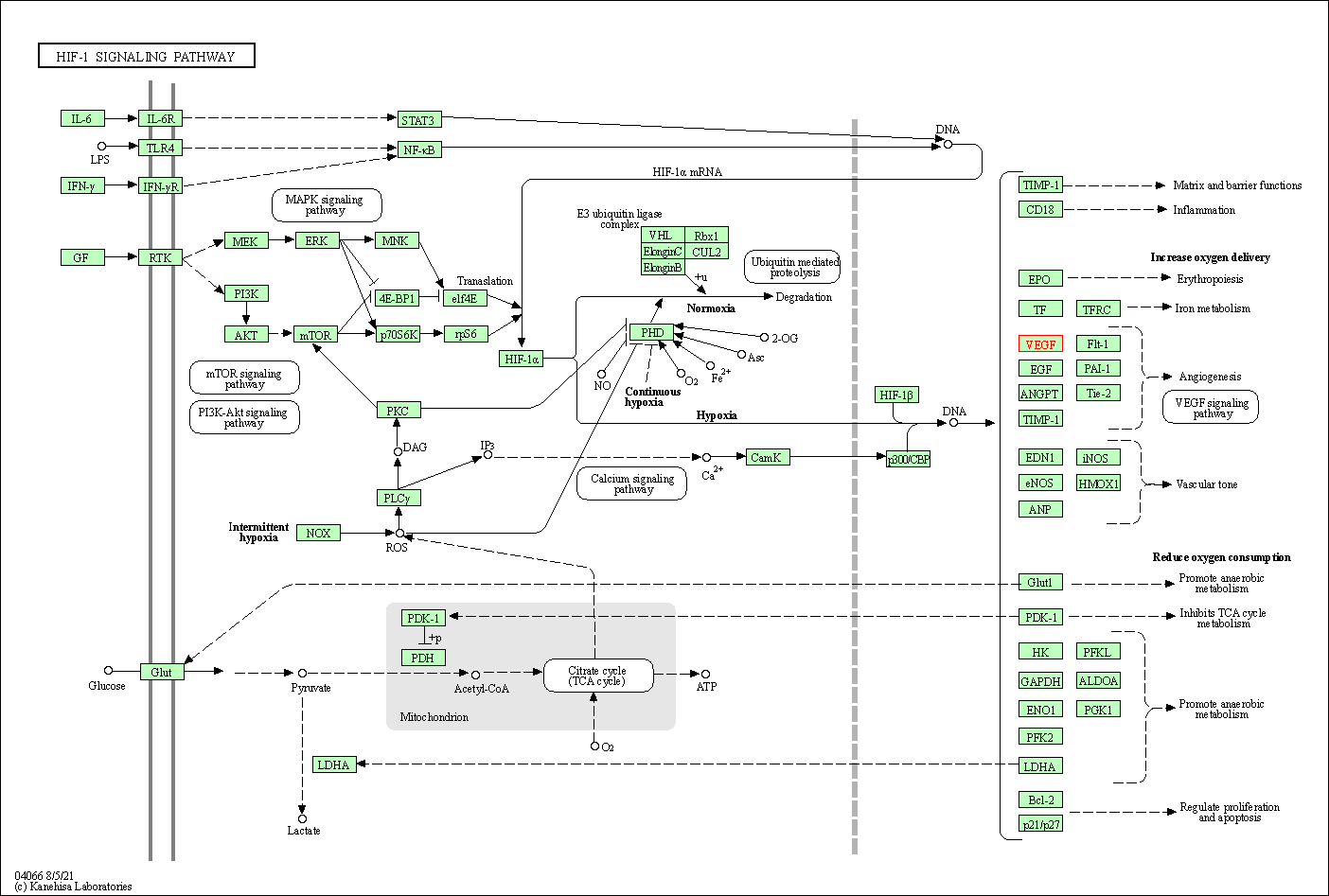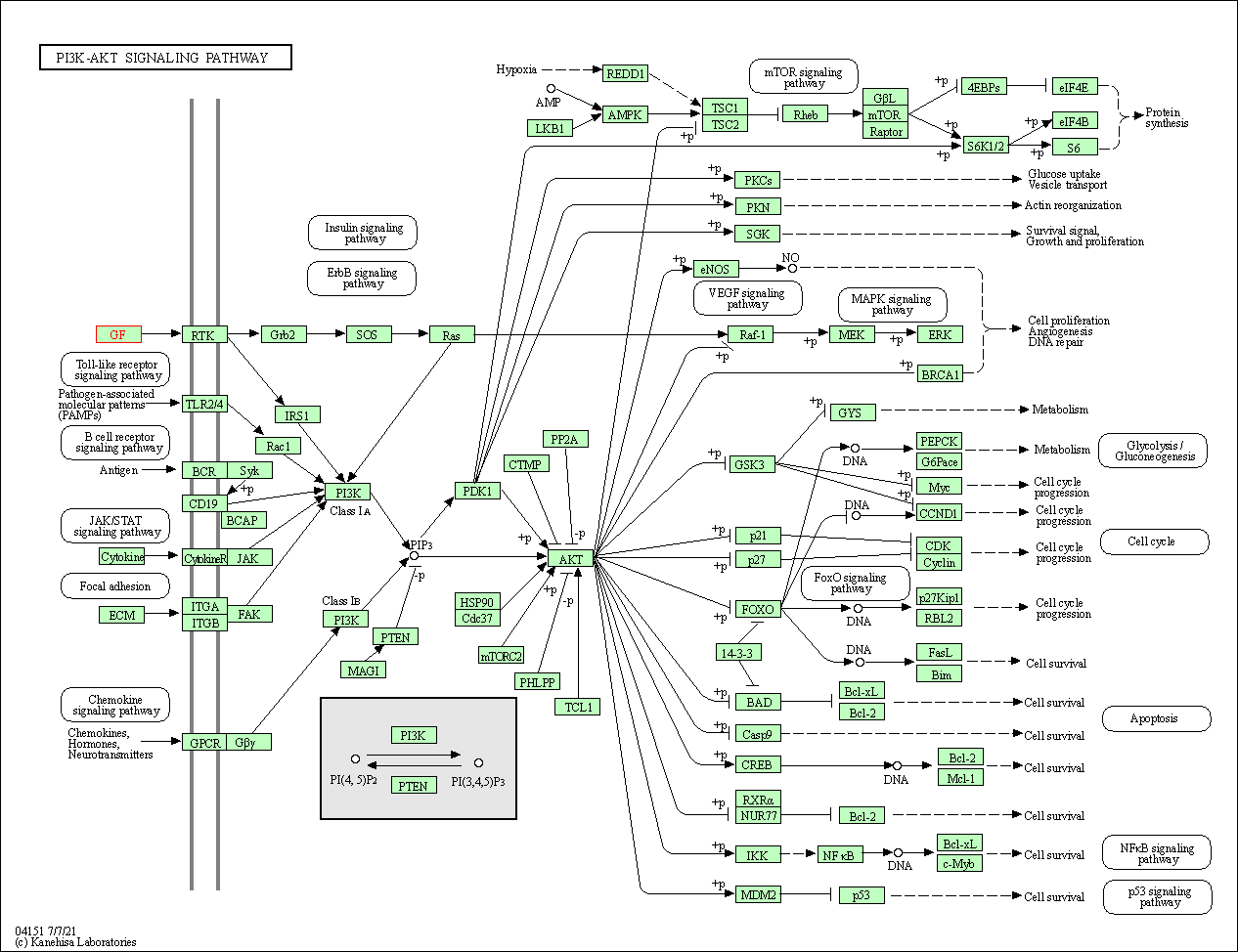Target Information
| Target General Information | Top | |||||
|---|---|---|---|---|---|---|
| Target ID |
T20761
(Former ID: TTDNS00542)
|
|||||
| Target Name |
Vascular endothelial growth factor A (VEGFA)
|
|||||
| Synonyms |
Vascular permeability factor; VPF; VEGF-A; VEGF
Click to Show/Hide
|
|||||
| Gene Name |
VEGFA
|
|||||
| Target Type |
Successful target
|
[1] | ||||
| Disease | [+] 3 Target-related Diseases | + | ||||
| 1 | Colorectal cancer [ICD-11: 2B91] | |||||
| 2 | Retinopathy [ICD-11: 9B71] | |||||
| 3 | Vascular system developmental anomaly [ICD-11: LA90] | |||||
| Function |
Induces endothelial cell proliferation, promotes cell migration, inhibits apoptosis and induces permeabilization of blood vessels. Binds to the FLT1/VEGFR1 and KDR/VEGFR2 receptors, heparan sulfate and heparin. NRP1/Neuropilin-1 binds isoforms VEGF-165 and VEGF-145. Isoform VEGF165B binds to KDR but does not activate downstream signaling pathways, does not activate angiogenesis and inhibits tumor growth. Binding to NRP1 receptor initiates a signaling pathway needed for motor neuron axon guidance and cell body migration, including for the caudal migration of facial motor neurons from rhombomere 4 to rhombomere 6 during embryonic development. Growth factor active in angiogenesis, vasculogenesis and endothelial cell growth.
Click to Show/Hide
|
|||||
| BioChemical Class |
Growth factor
|
|||||
| UniProt ID | ||||||
| Sequence |
MNFLLSWVHWSLALLLYLHHAKWSQAAPMAEGGGQNHHEVVKFMDVYQRSYCHPIETLVD
IFQEYPDEIEYIFKPSCVPLMRCGGCCNDEGLECVPTEESNITMQIMRIKPHQGQHIGEM SFLQHNKCECRPKKDRARQEKKSVRGKGKGQKRKRKKSRYKSWSVYVGARCCLMPWSLPG PHPCGPCSERRKHLFVQDPQTCKCSCKNTDSRCKARQLELNERTCRCDKPRR Click to Show/Hide
|
|||||
| 3D Structure | Click to Show 3D Structure of This Target | AlphaFold | ||||
| ADReCS ID | BADD_A01487 | |||||
| HIT2.0 ID | T42EAZ | |||||
| Drugs and Modes of Action | Top | |||||
|---|---|---|---|---|---|---|
| Approved Drug(s) | [+] 3 Approved Drugs | + | ||||
| 1 | Aflibercept | Drug Info | Approved | Metastatic colorectal cancer | [1] | |
| 2 | Bevacizumab | Drug Info | Approved | Metastatic colorectal cancer | [4] | |
| 3 | Ranibizumab | Drug Info | Approved | Hereditary hemorrhagic telangiectasia | [5], [6] | |
| Clinical Trial Drug(s) | [+] 13 Clinical Trial Drugs | + | ||||
| 1 | Avastin+/-Tarceva | Drug Info | Phase 3 | Non-small-cell lung cancer | [7] | |
| 2 | Bevacizumab + Erlotinib | Drug Info | Phase 3 | Metastatic colorectal cancer | [8], [9] | |
| 3 | Bevacizumab + Rituximab | Drug Info | Phase 3 | Non-hodgkin lymphoma | [10] | |
| 4 | Bevacizumab + Trastuzumab | Drug Info | Phase 3 | Breast cancer | [11] | |
| 5 | Abicipar pegol | Drug Info | Phase 2 | Diabetic macular edema | [12] | |
| 6 | PTC299 | Drug Info | Phase 2 | Rheumatoid arthritis | [13], [14] | |
| 7 | RG7221 | Drug Info | Phase 2 | Colorectal cancer | [15] | |
| 8 | RO5520985 | Drug Info | Phase 2 | Colorectal cancer | [16] | |
| 9 | MP0250 | Drug Info | Phase 1/2 | Non-small-cell lung cancer | [17] | |
| 10 | SNN-0029 | Drug Info | Phase 1/2 | Lateral sclerosis | [18] | |
| 11 | ABI-011 | Drug Info | Phase 1 | Solid tumour/cancer | [21] | |
| 12 | AT001/r84 | Drug Info | Phase 1 | Solid tumour/cancer | [22] | |
| 13 | Navicixizumab | Drug Info | Phase 1 | Colorectal cancer | [23] | |
| Patented Agent(s) | [+] 10 Patented Agents | + | ||||
| 1 | 3-phenyl-5-ureidoisothiazole-4-carboximide and 3-amino-5-phenylisothiazole derivative 1 | Drug Info | Patented | Cell proliferative disorder | [25] | |
| 2 | Antibodie derivative 7 | Drug Info | Patented | Solid tumour/cancer | [25] | |
| 3 | Conjugated 3-(indolyl)-and 3-(azaindolyl)-4-arylmaleimide compound 1 | Drug Info | Patented | Gastric adenocarcinoma | [25] | |
| 4 | Oxetane 3,3-dicarboxamide compound 1 | Drug Info | Patented | Virus infection | [25] | |
| 5 | PMID28621580-Compound-WO2013036866C66 | Drug Info | Patented | Solid tumour/cancer | [25] | |
| 6 | PMID28621580-Compound-WO2013112959C68 | Drug Info | Patented | Fibrosis | [25] | |
| 7 | PMID28621580-Compound-WO2015089220C70 | Drug Info | Patented | Retinopathy | [25] | |
| 8 | Pyridine derivative 4 | Drug Info | Patented | Solid tumour/cancer | [25] | |
| 9 | Pyrimidine derivative 5 | Drug Info | Patented | Neurodegenerative disorder | [24], [25], [26] | |
| 10 | Pyrimidine derivative 7 | Drug Info | Patented | Neurodegenerative disorder | [24], [25], [26] | |
| Mode of Action | [+] 3 Modes of Action | + | ||||
| Modulator | [+] 5 Modulator drugs | + | ||||
| 1 | Aflibercept | Drug Info | [1] | |||
| 2 | PTC299 | Drug Info | [32] | |||
| 3 | RG7221 | Drug Info | [33] | |||
| 4 | RO5520985 | Drug Info | [34] | |||
| 5 | SNN-0029 | Drug Info | [35] | |||
| Inhibitor | [+] 56 Inhibitor drugs | + | ||||
| 1 | Bevacizumab | Drug Info | [4] | |||
| 2 | Avastin+/-Tarceva | Drug Info | [29], [30] | |||
| 3 | Bevacizumab + Erlotinib | Drug Info | [31] | |||
| 4 | Bevacizumab + Rituximab | Drug Info | [31] | |||
| 5 | Bevacizumab + Trastuzumab | Drug Info | [31] | |||
| 6 | Abicipar pegol | Drug Info | [12] | |||
| 7 | MP0250 | Drug Info | [17] | |||
| 8 | ABI-011 | Drug Info | [17] | |||
| 9 | 1,6-naphyridine-4-ketone fused heterocyclic derivative 1 | Drug Info | [25] | |||
| 10 | 3-phenyl-5-ureidoisothiazole-4-carboximide and 3-amino-5-phenylisothiazole derivative 1 | Drug Info | [25] | |||
| 11 | Carbamide derivative 14 | Drug Info | [25] | |||
| 12 | Carbamide derivative 15 | Drug Info | [25] | |||
| 13 | Carbamide derivative 16 | Drug Info | [25] | |||
| 14 | Carbamide derivative 17 | Drug Info | [25] | |||
| 15 | Carbamide derivative 18 | Drug Info | [25] | |||
| 16 | Carbamide derivative 19 | Drug Info | [25] | |||
| 17 | Carbamide derivative 22 | Drug Info | [25] | |||
| 18 | Carbamide derivative 23 | Drug Info | [25] | |||
| 19 | Conjugated 3-(indolyl)-and 3-(azaindolyl)-4-arylmaleimide compound 1 | Drug Info | [25] | |||
| 20 | Indoline derivative 13 | Drug Info | [25] | |||
| 21 | Indoline derivative 14 | Drug Info | [25] | |||
| 22 | Indoline derivative 16 | Drug Info | [25] | |||
| 23 | Indoline derivative 17 | Drug Info | [25] | |||
| 24 | Indoline derivative 18 | Drug Info | [25] | |||
| 25 | Indoline derivative 19 | Drug Info | [25] | |||
| 26 | Indoline derivative 21 | Drug Info | [25] | |||
| 27 | Oxetane 3,3-dicarboxamide compound 1 | Drug Info | [25] | |||
| 28 | PMID28621580-Compound-WO2013036866C66 | Drug Info | [25] | |||
| 29 | PMID28621580-Compound-WO2013112959C68 | Drug Info | [25] | |||
| 30 | PMID28621580-Compound-WO2014079545C69 | Drug Info | [25] | |||
| 31 | PMID28621580-Compound-WO2015089220C70 | Drug Info | [25] | |||
| 32 | Pyridine derivative 10 | Drug Info | [25] | |||
| 33 | Pyridine derivative 11 | Drug Info | [25] | |||
| 34 | Pyridine derivative 2 | Drug Info | [25] | |||
| 35 | Pyridine derivative 3 | Drug Info | [25] | |||
| 36 | Pyridine derivative 4 | Drug Info | [25] | |||
| 37 | Pyridine derivative 5 | Drug Info | [25] | |||
| 38 | Pyridine derivative 6 | Drug Info | [25] | |||
| 39 | Pyridine derivative 7 | Drug Info | [25] | |||
| 40 | Pyridine derivative 8 | Drug Info | [25] | |||
| 41 | Pyridine derivative 9 | Drug Info | [25] | |||
| 42 | Pyrimidine derivative 10 | Drug Info | [25] | |||
| 43 | Pyrimidine derivative 11 | Drug Info | [25] | |||
| 44 | Pyrimidine derivative 5 | Drug Info | [25] | |||
| 45 | Pyrimidine derivative 7 | Drug Info | [25] | |||
| 46 | Pyrimidine derivative 8 | Drug Info | [25] | |||
| 47 | Pyrimidine derivative 9 | Drug Info | [25] | |||
| 48 | Quinoline and quinazoline derivative 10 | Drug Info | [25] | |||
| 49 | Quinoline and quinazoline derivative 2 | Drug Info | [25] | |||
| 50 | Quinoline and quinazoline derivative 3 | Drug Info | [25] | |||
| 51 | Quinoline and quinazoline derivative 4 | Drug Info | [25] | |||
| 52 | Quinoline and quinazoline derivative 5 | Drug Info | [25] | |||
| 53 | Quinoline and quinazoline derivative 6 | Drug Info | [25] | |||
| 54 | Quinoline and quinazoline derivative 7 | Drug Info | [25] | |||
| 55 | Quinoline and quinazoline derivative 8 | Drug Info | [25] | |||
| 56 | Quinoline and quinazoline derivative 9 | Drug Info | [25] | |||
| Binder | [+] 2 Binder drugs | + | ||||
| 1 | Antibodie derivative 2 | Drug Info | [25] | |||
| 2 | Antibodie derivative 7 | Drug Info | [25] | |||
| Cell-based Target Expression Variations | Top | |||||
|---|---|---|---|---|---|---|
| Cell-based Target Expression Variations | ||||||
| Drug Binding Sites of Target | Top | |||||
|---|---|---|---|---|---|---|
| Ligand Name: Trifluoroacetic Acid | Ligand Info | |||||
| Structure Description | The crystal structure of chemically synthesized VEGF-A | PDB:3QTK | ||||
| Method | X-ray diffraction | Resolution | 1.85 Å | Mutation | No | [36] |
| PDB Sequence |
VVKFMDVYQR
16 SYCHPIETLV26 DIFQEYPDEI36 EYIFKPSCVP46 LMRCGGCCND56 EGLECVPTEE 66 SNITMQIMRI76 KPHQGQHIGE86 MSFLQHNKCE96 CRPKKD
|
|||||
|
|
||||||
| Click to View More Binding Site Information of This Target with Different Ligands | ||||||
| Different Human System Profiles of Target | Top |
|---|---|
|
Human Similarity Proteins
of target is determined by comparing the sequence similarity of all human proteins with the target based on BLAST. The similarity proteins for a target are defined as the proteins with E-value < 0.005 and outside the protein families of the target.
A target that has fewer human similarity proteins outside its family is commonly regarded to possess a greater capacity to avoid undesired interactions and thus increase the possibility of finding successful drugs
(Brief Bioinform, 21: 649-662, 2020).
Human Tissue Distribution
of target is determined from a proteomics study that quantified more than 12,000 genes across 32 normal human tissues. Tissue Specificity (TS) score was used to define the enrichment of target across tissues.
The distribution of targets among different tissues or organs need to be taken into consideration when assessing the target druggability, as it is generally accepted that the wider the target distribution, the greater the concern over potential adverse effects
(Nat Rev Drug Discov, 20: 64-81, 2021).
Human Pathway Affiliation
of target is determined by the life-essential pathways provided on KEGG database. The target-affiliated pathways were defined based on the following two criteria (a) the pathways of the studied target should be life-essential for both healthy individuals and patients, and (b) the studied target should occupy an upstream position in the pathways and therefore had the ability to regulate biological function.
Targets involved in a fewer pathways have greater likelihood to be successfully developed, while those associated with more human pathways increase the chance of undesirable interferences with other human processes
(Pharmacol Rev, 58: 259-279, 2006).
Biological Network Descriptors
of target is determined based on a human protein-protein interactions (PPI) network consisting of 9,309 proteins and 52,713 PPIs, which were with a high confidence score of ≥ 0.95 collected from STRING database.
The network properties of targets based on protein-protein interactions (PPIs) have been widely adopted for the assessment of target’s druggability. Proteins with high node degree tend to have a high impact on network function through multiple interactions, while proteins with high betweenness centrality are regarded to be central for communication in interaction networks and regulate the flow of signaling information
(Front Pharmacol, 9, 1245, 2018;
Curr Opin Struct Biol. 44:134-142, 2017).
Human Similarity Proteins
Human Tissue Distribution
Human Pathway Affiliation
Biological Network Descriptors
|
|
|
There is no similarity protein (E value < 0.005) for this target
|
|
Note:
If a protein has TS (tissue specficity) scores at least in one tissue >= 2.5, this protein is called tissue-enriched (including tissue-enriched-but-not-specific and tissue-specific). In the plots, the vertical lines are at thresholds 2.5 and 4.
|
| KEGG Pathway | Pathway ID | Affiliated Target | Pathway Map |
|---|---|---|---|
| MAPK signaling pathway | hsa04010 | Affiliated Target |

|
| Class: Environmental Information Processing => Signal transduction | Pathway Hierarchy | ||
| Ras signaling pathway | hsa04014 | Affiliated Target |

|
| Class: Environmental Information Processing => Signal transduction | Pathway Hierarchy | ||
| Rap1 signaling pathway | hsa04015 | Affiliated Target |

|
| Class: Environmental Information Processing => Signal transduction | Pathway Hierarchy | ||
| Calcium signaling pathway | hsa04020 | Affiliated Target |

|
| Class: Environmental Information Processing => Signal transduction | Pathway Hierarchy | ||
| HIF-1 signaling pathway | hsa04066 | Affiliated Target |

|
| Class: Environmental Information Processing => Signal transduction | Pathway Hierarchy | ||
| PI3K-Akt signaling pathway | hsa04151 | Affiliated Target |

|
| Class: Environmental Information Processing => Signal transduction | Pathway Hierarchy | ||
| VEGF signaling pathway | hsa04370 | Affiliated Target |

|
| Class: Environmental Information Processing => Signal transduction | Pathway Hierarchy | ||
| Focal adhesion | hsa04510 | Affiliated Target |

|
| Class: Cellular Processes => Cellular community - eukaryotes | Pathway Hierarchy | ||
| Relaxin signaling pathway | hsa04926 | Affiliated Target |

|
| Class: Organismal Systems => Endocrine system | Pathway Hierarchy | ||
| Click to Show/Hide the Information of Affiliated Human Pathways | |||
| Degree | 49 | Degree centrality | 5.26E-03 | Betweenness centrality | 6.68E-03 |
|---|---|---|---|---|---|
| Closeness centrality | 2.67E-01 | Radiality | 1.46E+01 | Clustering coefficient | 1.55E-01 |
| Neighborhood connectivity | 5.09E+01 | Topological coefficient | 4.34E-02 | Eccentricity | 11 |
| Download | Click to Download the Full PPI Network of This Target | ||||
| Chemical Structure based Activity Landscape of Target | Top |
|---|---|
| Drug Property Profile of Target | Top | |
|---|---|---|
| (1) Molecular Weight (mw) based Drug Clustering | (2) Octanol/Water Partition Coefficient (xlogp) based Drug Clustering | |
|
|
||
| (3) Hydrogen Bond Donor Count (hbonddonor) based Drug Clustering | (4) Hydrogen Bond Acceptor Count (hbondacc) based Drug Clustering | |
|
|
||
| (5) Rotatable Bond Count (rotbonds) based Drug Clustering | (6) Topological Polar Surface Area (polararea) based Drug Clustering | |
|
|
||
| "RO5" indicates the cutoff set by lipinski's rule of five; "D123AB" colored in GREEN denotes the no violation of any cutoff in lipinski's rule of five; "D123AB" colored in PURPLE refers to the violation of only one cutoff in lipinski's rule of five; "D123AB" colored in BLACK represents the violation of more than one cutoffs in lipinski's rule of five | ||
| Co-Targets | Top | |||||
|---|---|---|---|---|---|---|
| Co-Targets | ||||||
| Target Poor or Non Binders | Top | |||||
|---|---|---|---|---|---|---|
| Target Poor or Non Binders | ||||||
| Target Regulators | Top | |||||
|---|---|---|---|---|---|---|
| Target-regulating microRNAs | ||||||
| Target-regulating Transcription Factors | ||||||
| Target-interacting Proteins | ||||||
| Target Profiles in Patients | Top | |||||
|---|---|---|---|---|---|---|
| Target Expression Profile (TEP) | ||||||
| References | Top | |||||
|---|---|---|---|---|---|---|
| REF 1 | Drugs@FDA. U.S. Food and Drug Administration. U.S. Department of Health & Human Services. 2015 | |||||
| REF 2 | FDA Approved Drug Products from FDA Official Website. 2023. Application Number: 761235. | |||||
| REF 3 | Drugs@FDA. U.S. Food and Drug Administration. U.S. Department of Health Human Services. 2019 | |||||
| REF 4 | FDA Approved Drug Products from FDA Official Website. 2004. Application Number: (ANDA) 125085. | |||||
| REF 5 | URL: http://www.guidetopharmacology.org Nucleic Acids Res. 2015 Oct 12. pii: gkv1037. The IUPHAR/BPS Guide to PHARMACOLOGY in 2016: towards curated quantitative interactions between 1300 protein targets and 6000 ligands. (Ligand id: 6779). | |||||
| REF 6 | Ranibizumab: Phase III clinical trial results. Ophthalmol Clin North Am. 2006 Sep;19(3):361-72. | |||||
| REF 7 | Clinical pipeline report, company report or official report of Roche. | |||||
| REF 8 | ClinicalTrials.gov (NCT00130728) A Study to Evaluate the Efficacy of Bevacizumab in Combination With Tarceva for Advanced Non-Small Cell Lung Cancer | |||||
| REF 9 | ClinicalTrials.gov (NCT00598156) Chemotherapy and Avastin Followed by Maintenance Treatment With Avastin +/- Tarceva | |||||
| REF 10 | ClinicalTrials.gov (NCT00486759) A Study of Bevacizumab (Avastin) in Combination With Rituximab (MabThera) and CHOP (Cyclophosphamide, Hydroxydaunorubicin [Doxorubicin], Oncovin [Vincristine], Prednisone) Chemotherapy in Patients With Diffuse Large B-cell Lymphoma. U.S. National Institutes of Health. | |||||
| REF 11 | AVEREL: a randomized phase III Trial evaluating bevacizumab in combination with docetaxel and trastuzumab as first-line therapy for HER2-positive locally recurrent/metastatic breast cancer. J Clin Oncol. 2013 May 10;31(14):1719-25. | |||||
| REF 12 | Clinical pipeline report, company report or official report of the Pharmaceutical Research and Manufacturers of America (PhRMA) | |||||
| REF 13 | URL: http://www.guidetopharmacology.org Nucleic Acids Res. 2015 Oct 12. pii: gkv1037. The IUPHAR/BPS Guide to PHARMACOLOGY in 2016: towards curated quantitative interactions between 1300 protein targets and 6000 ligands. (Ligand id: 6040). | |||||
| REF 14 | The effects of antiinflammatory and antiallergic drugs on cytokine release after stimulation of human whole blood by lipopolysaccharide and zymosan A. Inflamm Res. 1995 Jul;44(7):269-74. | |||||
| REF 15 | Trusted, scientifically sound profiles of drug programs, clinical trials, safety reports, and company deals, written by scientists. Springer. 2015. Adis Insight (drug id 800037469) | |||||
| REF 16 | ClinicalTrials.gov (NCT02141295) A Study Comparing the Efficacy and Safety of Vanucizumab and FOLFOX With Bevacizumab and FOLFOX in Participants With Untreated Metastatic Colorectal Cancer | |||||
| REF 17 | Clinical pipeline report, company report or official report of the Pharmaceutical Research and Manufacturers of America (PhRMA) | |||||
| REF 18 | ClinicalTrials.gov (NCT01384162) An Open Label, Safety and Tolerability Continuation Study of Intracerebroventricular Administration of sNN0029 to Patients With Amyotrophic Lateral Sclerosis. U.S. National Institutes of Health. | |||||
| REF 19 | ClinicalTrials.gov (NCT01042678) Study of MP0112 Intravitreal Injection in Patients With Diabetic Macular Edema. U.S. National Institutes of Health. | |||||
| REF 20 | ClinicalTrials.gov (NCT01024998) Safety and Tolerability Study of AAV2-sFLT01 in Patients With Neovascular Age-Related Macular Degeneration (AMD). U.S. National Institutes of Health. | |||||
| REF 21 | ClinicalTrials.gov (NCT01163071) A Phase 1 Trial of ABI-011 in Patients With Advanced Solid Tumors or Lymphomas. U.S. National Institutes of Health. | |||||
| REF 22 | Clinical pipeline report, company report or official report of Affitech (2011). | |||||
| REF 23 | Clinical pipeline report, company report or official report of the Pharmaceutical Research and Manufacturers of America (PhRMA) | |||||
| REF 24 | Novel NF-B inhibitors: a patent review (2011 - 2014).Expert Opin Ther Pat. 2015 Mar;25(3):319-34. | |||||
| REF 25 | VEGFR-2 inhibitors and the therapeutic applications thereof: a patent review (2012-2016).Expert Opin Ther Pat. 2017 Sep;27(9):987-1004. | |||||
| REF 26 | Caspase inhibitors: a review of recently patented compounds (2013-2015).Expert Opin Ther Pat. 2018 Jan;28(1):47-59. | |||||
| REF 27 | 2011 Pipeline of Acuity Pharmaceuticals. | |||||
| REF 28 | Development of ranibizumab, an anti-vascular endothelial growth factor antigen binding fragment, as therapy for neovascular age-related macular degeneration. Retina. 2006 Oct;26(8):859-70. | |||||
| REF 29 | Clinical pipeline report, company report or official report of Genentech (2009). | |||||
| REF 30 | Clinical pipeline report, company report or official report of Genentech (2009). | |||||
| REF 31 | Clinical pipeline report, company report or official report of Roche (2009). | |||||
| REF 32 | Phase I and pharmacokinetic trial of PTC299 in pediatric patients with refractory or recurrent central nervous system tumors: a PBTC study.J Neurooncol.2015 Jan;121(1):217-24. | |||||
| REF 33 | Bispecific antibodies and their applications | |||||
| REF 34 | Bispecific antibodies rise again. Nat Rev Drug Discov. 2014 Nov;13(11):799-801. | |||||
| REF 35 | Clinical pipeline report, company report or official report of Neuronova. | |||||
| REF 36 | Total chemical synthesis of biologically active vascular endothelial growth factor. Angew Chem Int Ed Engl. 2011 Aug 22;50(35):8029-33. | |||||
If You Find Any Error in Data or Bug in Web Service, Please Kindly Report It to Dr. Zhou and Dr. Zhang.

